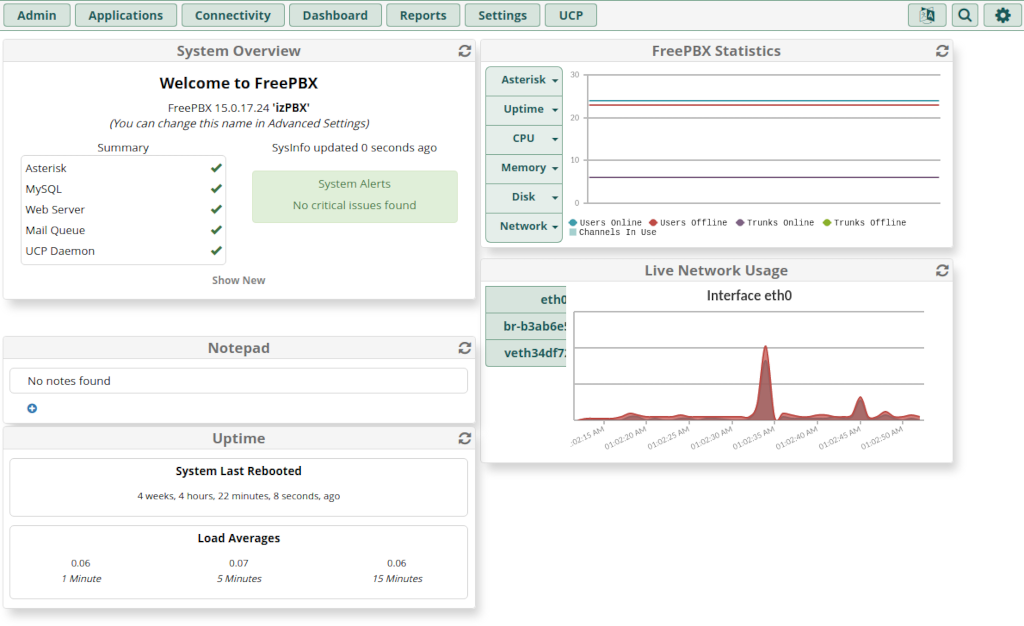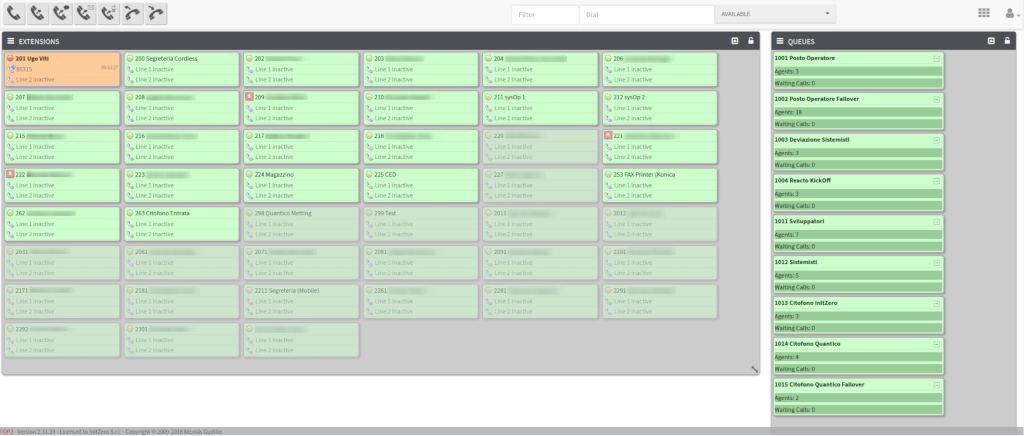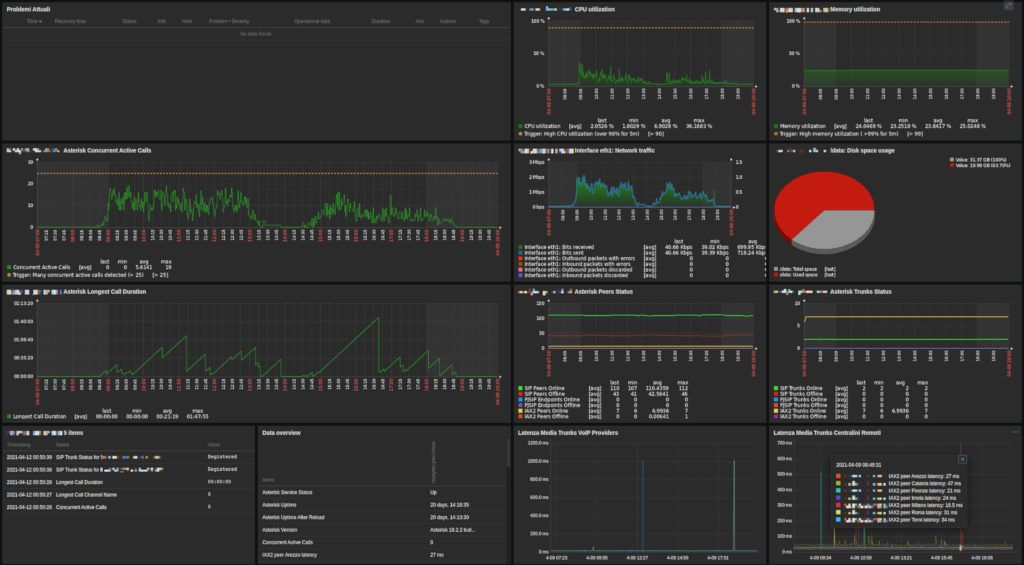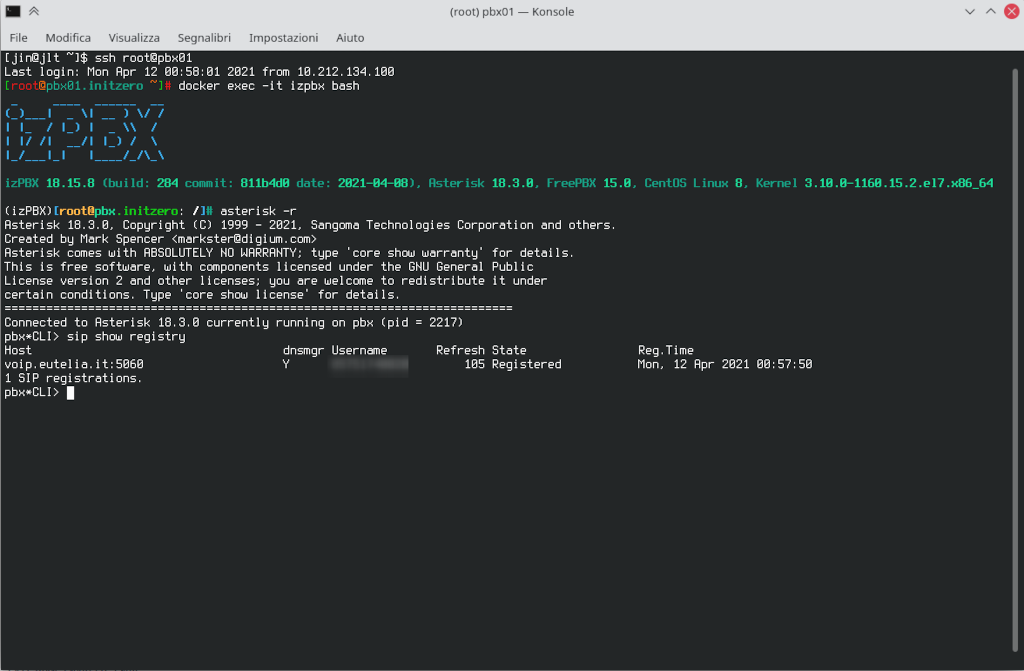
izPBX is a Turnkey Cloud Native VoIP Telephony System powered by Asterisk Engine and FreePBX Management GUI
latest,18,18.15,18.15.X,18.15.X-BUILD,18.15.X-COMMIT
0,0.9,0.9.X,0.9.X-BUILD,0.9.X-COMMIT
- Asterisk 18 LTS + FreePBX 15:
dev-18,dev-18.X,dev-18.X.X-BUILD,dev-18.X.X-COMMIT - Asterisk 16 LTS + FreePBX 15:
dev-16,dev-16.X,dev-16.X.X-BUILD,dev-16.X.X-COMMIT
Tags format: Z.Y.X-[BUILD|COMMIT]
where:
- Z = Asterisk release (PBX engine)
- Y = FreePBX release (PBX GUI)
- X = izPBX release (this project)
- BUILD = Build number | COMMIT = GIT commit ID
Look into project Tags page to discover the latest versions
- Fast initial bootstrap to deploy a full features PBX system (60 secs install time from zero to a running turnkey PBX system)
- Built-in PBX Engine based on Asterisk® project (compiled from scratch)
- Built-in WEB Management GUI based on FreePBX® project (with default predownloaded modules for quicker initial deploy)
- No vendor lock-in, you can migrare to izPBX and away izPBX simply importing/exporting FreePBX Backups
- Based on Rocky Linux 8 64bit OS (RHEL derivate with long term support)
- Small container image footprint (~450 MB)
- Multi-Tenant PBX System Support (look into Advanced Production Configuration Examples section)
- Automatic Remote XML PhoneBook support for compatible VoIP Phones
- Persistent storage mode for configuration and not volatile data
- Fail2ban as security monitor to block SIP and HTTP brute force attacks
- FOP2 Operator Panel
- Integrated Asterisk Zabbix agent for services health monitoring
- Misc
izpbx-*tools scripts (likeizpbx-callstats) izsynthutility - TTS/Text To Speech synthesizer, background music overlay assembler and audio file converter for PBX and Home Automation Systemstcpdumpandsngreputility to debug VoIP calls- supervisord as services management with monitoring and automatic restart when services fail
- postfix MTA daemon for sending mails (notifications, voicemails and FAXes)
- Integrated cron daemon for running scheduled tasks
- Integrated TFTP and DHCP server powered by DNSMasq for autoprovisioning VoIP Phones
- Integrated NTP Server
- Apache 2.4 and PHP 7.2 (mpm_prefork+mod_php configuration mode)
- Automatic Let's Encrypt HTTPS certificate management for exposed PBXs to Internet
- Custom commercial SSL Certificates support
- Logrotating of service logs
- All configurations made via single central
.envfile - Many customizable variables to use (look inside
default.envfile) - Only two containers setup: (Antipattern container design but needed by the FreePBX ecosystem to works)
- izpbx (izpbx-asterisk container: Asterisk Engine + FreePBX Frontend + others services)
- izpbx-db (mariadb container: Database Backend)
On-Premise, fast, automatic and repeatable deploy of PBX systems.
by default network_mode: host is used, so the PBX network is esposed directly in the host interface (no internal container network is used), so the default UDP RTP port range can be from 10000 to 20000.
If you plan to disable network_mode: host, tune the port range (forwarding 10000 ports with the docker stack make high cpu usage and longer startup times), for example for 50 concurrent calls:
APP_PORT_RTP_START=10000
APP_PORT_RTP_END=10200
for best security, fine-tune the ports range based on your needs by not using standard port ranges!
- Deploy 1 izPBX instance for every host. No multi deploy works out of the box by default when using
network_mode: host(look Advanced Production Configuration Examples section for Multi-Tenant Solutions) - Container Antipattern Design (FreePBX was not designed to run as containerized app, and its ecosystem requires numerous modules to function, and the FreePBX modules updates will managed by FreePBX Admin Modules Pages itself not by izPBX container updates)
Using docker-compose is the suggested method:
-
Install your prefered Linux OS into VM or Baremetal Server
-
Install Docker Runtime and docker-compose utility for your Operating System from https://www.docker.com/get-started
- RHEL8 based distro Quick&Dirty commands (skip if you use other distribution):
sudo dnf config-manager --add-repo=https://download.docker.com/linux/centos/docker-ce.repo
sudo dnf install docker-ce -y
eval sudo curl -L "$(curl -s https://api.github.com/repos/docker/compose/releases/latest | grep browser_download_url | grep "docker-compose-$(uname -s)-$(uname -m)\"" | awk '{print $2}')" -o /usr/local/bin/docker-compose && sudo chmod +x /usr/local/bin/docker-compose
sudo systemctl enable --now docker
-
Create a
docker-compose.yml, or clone git repository, or download latest tarbal release from: https://github.com/ugoviti/izdock-izpbx/releases and unpack it into a directory (ex./opt/izpbx), faster method with git:git clone https://github.com/ugoviti/izdock-izpbx.git /opt/izpbxcd /opt/izpbx
-
Checkout into latest official release:
git checkout refs/tags/$(git tag | sort --version-sort | tail -1)
-
Copy default configuration file
default.envinto.env:cp default.env .env
-
Customize
.envvariables, specially the security section of default passwords:vim .env
-
Deploy and start izpbx using docker-compose command:
docker-compose up -d
-
Wait the pull to finish (~60 seconds with fast internet connections) and point your web browser to the IP address of your docker host and follow initial setup guide
Note: by default, to correctly handle SIP NAT and SIP-RTP UDP traffic, the izpbx container will use the network_mode: host, so the izpbx container will be exposed directly to the outside network without using docker internal network range (network_mode: host will prevent multiple izpbx containers from running inside the same host).
Modify docker-compose.yml and comment #network_mode: host if you want run multiple izpbx containers in the same host (not production tested. There will be problems with RTP traffic).
Another available option is to disable network_mode: host and use macvlan network mode used for running izPBX into multi-tenant mode.
If you want test izPBX without using docker-compose, you can use the following docker commands:
-
Start MySQL:
docker run --rm -ti -v ./data/db:/var/lib/mysql -e MYSQL_ROOT_PASSWORD=CHANGEM3 -e MYSQL_PASSWORD=CHANGEM3 --name izpbx-db mariadb:10.4 -
Start izPBX:
docker run --rm -ti --network=host --privileged --cap-add=NET_ADMIN -v ./data/izpbx:/data -e MYSQL_ROOT_PASSWORD=CHANGEM3 -e MYSQL_PASSWORD=CHANGEM3 -e MYSQL_SERVER=127.0.0.1 -e MYSQL_DATABASE=asterisk -e MYSQL_USER=asterisk -e APP_DATA=/data --name izpbx izpbx-asterisk:latest
- Upgrade the version of izpbx by downloading a new tgz release, or changing image tag into docker-compose.yml file (from git releases page, verify if upstream docker compose was updated), or if you cloned directly from GIT, use the following commands as quick method:
cd /opt/izpbx
git pull
git checkout refs/tags/$(git tag | sort --version-sort | tail -1)
- Upgrade the izpbx deploy with:
(NB. First verify ifdocker-compose.ymlanddefault.envwas updated a make the same changes in your.envfile)
docker-compose pull
docker-compose up -d
-
If the mariadb database version was changed, rememeber to update tables schema with command
source .env ; docker exec -it izpbx-db mysql_upgrade -u root -p$MYSQL_ROOT_PASSWORD -
Open FreePBX Web URL and verify if exist any modules updates from FreePBX Menù: Admin-->Modules Admin: Check Online
That's all
FreePBX will be installed into persistent data dir on initial deploy only (when no installations already exist).
Successive container updates will not upgrade the FreePBX Framework (only Asterisk engine will be updated).
After initial deploy, upgrading FreePBX Core and Modules and Major Release (es. from 15.x to 16.x) is possible only via official FreePBX upgrade method:
- FreePBX Menù: Admin-->Modules Admin: Check Online select FreePBX Upgrader
Recap: only Asterisk core engine will be updated on container image update. FreePBX will be updated only via Modules Update Menu.
- Run many izPBX instances into single docker host (you must allocate an external static IP for every izPBX backend/frontend)
- Dedicated Database for every izPBX instances
Create a directory where you want deploy izpbx data and create docker-compose.yml and .env files:
Example:
mkdir yourgreatpbx
cd yourgreatpbx
vim docker-compose.yml
vim .env
NOTE:
- Modify
docker-compose.ymlaccording to your environment needs:parent:(must be specified your ethernet card)subnet:(must match you intranet network range)ipv4_address:(every izPBX frontend will must to have a different external IP)
- Modify
.envaccording to your environment needs:MYSQL_SERVER=db(you can't use localhost here)
version: '3'
networks:
izpbx-0-ext:
driver: macvlan
driver_opts:
parent: eth0
ipam:
config:
- subnet: 10.1.1.0/24
#ip_range: "10.1.1.221/30"
#gateway: 10.1.1.1
izpbx-1:
driver: bridge
services:
db:
image: mariadb:10.5.9
## WARNING: if you upgrade image tag enter the container and run mysql_upgrade:
## source .env ; docker exec -it izpbx-db mysql_upgrade -u root -p$MYSQL_ROOT_PASSWORD
command: --sql-mode=ERROR_FOR_DIVISION_BY_ZERO,NO_AUTO_CREATE_USER,NO_ENGINE_SUBSTITUTION
restart: unless-stopped
env_file:
- .env
environment:
- MYSQL_ROOT_PASSWORD
- MYSQL_DATABASE
- MYSQL_USER
- MYSQL_PASSWORD
## database configurations
volumes:
- ./data/db:/var/lib/mysql
networks:
izpbx-1:
izpbx:
#hostname: ${APP_FQDN}
image: izdock/izpbx-asterisk:18.15.11
restart: unless-stopped
depends_on:
- db
env_file:
- .env
volumes:
- ./data/izpbx:/data
cap_add:
- SYS_ADMIN
- NET_ADMIN
privileged: true
networks:
izpbx-0-ext:
ipv4_address: 10.1.1.221
izpbx-1:Repeat the procedure for every izPBX you want deploy. Remember to create a dedicated directory for every izpbx deploy.
Enter in every directory containig configuration files and run:
docker-compose up -d
- Run many izPBX instances into single docker host (you must allocate an external static IP for every izPBX backend/frontend)
- Single Global Shared Database used by all izPBX instances
Create a directory where you want deploy all izpbx data and create docker-compose.yml and a PBXNAME.env file for every izpbx deploy:
Example:
mkdir izpbx
cd izpbx
vim docker-compose.yml
vim izpbx1.env
vim izpbx2.env
vim izpbx3.env
etc...
NOTE:
- Modify
docker-compose.ymlaccording to your environment needs, changing:parent:(must be specified your ethernet card)subnet:(must match you intranet network range)ipv4_address:(every izPBX frontend will must to have a different external IP)
- Rembember to modify every
PBXNAME.envfile and set different variables forMYSQL(for best security use a different password for every deploy), example:MYSQL_SERVER=db(all deployes will use the same db name)MYSQL_DATABASE=izpbx1_asteriskMYSQL_DATABASE_CDR=izpbx1_asteriskcdrdbMYSQL_USER=izpbx1_asteriskMYSQL_PASSWORD=izpbx1_AsteriskPasswordV3ryS3cur3- so on...
version: '3'
networks:
izpbx-0-ext:
driver: macvlan
driver_opts:
parent: enp0s13f0u3u1u3
ipam:
config:
- subnet: 10.1.1.0/24
izpbx-1:
driver: bridge
services:
db:
image: mariadb:10.5.9
## WARNING: if you upgrade image tag enter the container and run mysql_upgrade:
## source .env ; docker exec -it izpbx-db mysql_upgrade -u root -p$MYSQL_ROOT_PASSWORD
command: --sql-mode=ERROR_FOR_DIVISION_BY_ZERO,NO_AUTO_CREATE_USER,NO_ENGINE_SUBSTITUTION
restart: unless-stopped
env_file:
- db.env
environment:
- MYSQL_ROOT_PASSWORD
- MYSQL_DATABASE
- MYSQL_USER
- MYSQL_PASSWORD
## database configurations
volumes:
- ./data/db:/var/lib/mysql
networks:
izpbx-1:
izpbx1:
#hostname: ${APP_FQDN}
image: izdock/izpbx-asterisk:18.15.11
restart: unless-stopped
depends_on:
- db
env_file:
- izpbx1.env
volumes:
- ./data/izpbx1:/data
cap_add:
- NET_ADMIN
privileged: true
networks:
izpbx-0-ext:
ipv4_address: 10.1.1.221
izpbx-1:
izpbx2:
#hostname: ${APP_FQDN}
image: izdock/izpbx-asterisk:18.15.11
restart: unless-stopped
depends_on:
- db
env_file:
- izpbx2.env
volumes:
- ./data/izpbx2:/data
cap_add:
- NET_ADMIN
privileged: true
networks:
izpbx-0-ext:
ipv4_address: 10.1.1.222
izpbx-1:
izpbx3:
#hostname: ${APP_FQDN}
image: izdock/izpbx-asterisk:18.15.11
restart: unless-stopped
depends_on:
- db
env_file:
- izpbx3.env
volumes:
- ./data/izpbx3:/data
cap_add:
- NET_ADMIN
privileged: true
networks:
izpbx-0-ext:
ipv4_address: 10.1.1.223
izpbx-1:Enter the directory containig configuration files and run:
docker-compose up -d
docker restart izpbx
docker restart izpbx-db
Enter the container:
docker exec -it izpbx bash
Restart izpbx service (Asterisk Engine):
supervisorctl restart izpbx
To restart others available services use supervisorctl restart SERVICE
Available services:
asteriskcronfail2banfop2httpdizpbxtftpdpostfixzabbix-agent
Tested Docker Runtime:
- moby-engine 19.03
- docker-ce 19.03
- docker-compose 1.25
Tested Host Operating Systems:
- RHEL 6/7/8 based distro
- Fedora Core >30
- Debian 10
- Ubuntu 20.04
Consult the default.env file:
Consult official repository page for installation and configuration of Asterisk Zabbix Template in you Zabbix Server:
-
Settings-->Advanced Settings
- CW Enabled by Default: NO
- Country Indication Tones: Italy
- Ringtime Default: 60 seconds
- Speaking Clock Time Format: 24H
- PHP Timezone: Europe/Rome
-
Settings-->Asterisk Logfile Settings
- Security Settings-->Allow Anonymous Inbound SIP Calls: No
- Security Settings-->Allow SIP Guests: No
-
Settings-->Asterisk SIP Settings
- File Name: security
- Security: ON (all others OFF)
-
Settings-->Filestore-->Local
- Path Name: Local Storage
- Path: ASTSPOOLDIR/backup
-
Admin-->Backup & Restore
- Basic Information-->Backup Name: Daily Backup
- Notifications-->Email Type: Failure
- Storage-->Storage Location: Local Storage
- Schedule and Maintinence-->Enabled: Yes
- Schedule and Maintinence-->Scheduling: Every: Day Minute: 00 Hour: 00
- Maintinence-->Delete After Runs: 0
- Maintinence-->Delete After Days: 14
-
Admin-->Contact Manager
- External
- Add New Group
- Name: PhoneBook
- Type: External
- Add New Group
- External
-
Admin-->Caller ID Lookup Sources
- Source Description: ContactManager
- Source type: Contact Manager
- Cache Results: No
- Contact Manager Group(s): All selected
-
Admin-->Sound Languages-->Setttings
- Global Language: Italian
NOTE: Tested on Yealink Phones
- Configure Contact Manager as reported above (the Contact Manager GroupName be MUST named PhoneBook otherwise doesn't works by default)
- Open VoIP Phone GUI (Yealink Phone GUI):
- Directory-->Remote Phone Book
- Index 1 (URL for XML Menu)
- RemoteURL: http://PBX_ADDRESS/pb
- Display Name: PhoneBook
- Index 1 (URL for XML Menu)
- Directory-->Remote Phone Book
- Open VoIP Phone GUI (Yealink Phone GUI):
- Directory-->Remote Phone Book
- Index 1 (URL for Extensions PhoneBook)
- RemoteURL: http://PBX_ADDRESS/pb/yealink/ext
- Display Name: Extensions
- Index 2 (URL for Shared PhoneBook)
- RemoteURL: http://PBX_ADDRESS/pb/yealink/cm
- Display Name: Shared Phone Book
- Index 1 (URL for Extensions PhoneBook)
- Directory-->Remote Phone Book
-
FreePBX is slow to reload (https://issues.freepbx.org/browse/FREEPBX-20559)
- As temporary WORKAROUND enter into izpbx container shell and run:
docker exec -it izpbx bash
fwconsole setting SIGNATURECHECK 0
- As temporary WORKAROUND enter into izpbx container shell and run:
-
Factory Reset / Start from scratch a clean configurations (WARNING! you persistent storage will be wiped!):
docker-compose downrm -rf datadocker-compose up -d
- Kubernetes deploy via Helm Chart (major problems for RTP UDP ports range... needs further investigation, no valid solutions right now)
- Hylafax+ Server + IAXModem (used for sending FAXes. Receiving FAXes via mail is already possibile using FreePBX FAX Module)
- macOS host support? (edit docker-compose.yml and comment localtime volume?)
- Windows host support (need to use docker volume instead local directory path?)
- Unpredictable network interface order when running in Multi-Tenant mode. As workaround used, the network interface name must be named in lexical order. refs:
- By default FreePBX use Signature Checking for modules packages, but this make very high deplays when reloading FreePBX, so by default is been disabled. refs:
-
Developed and maintained by: Ugo Viti @ InitZero S.r.l.
-
Where to file issues: https://github.com/ugoviti/izdock-izpbx/issues
-
Where to get commercial help: email: support@initzero.it - web: InitZero Support
-
Supported architectures: [
amd64] -
Supported Docker versions: the latest release (down to 1.6 on a best-effort basis)
-
License: GPL v3



